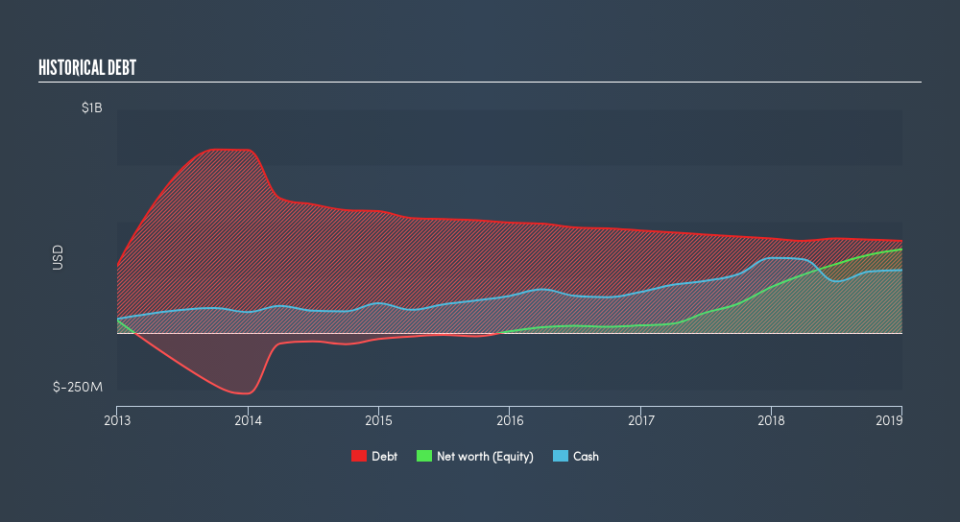You Might Like TriNet Group, Inc. (NYSE:TNET) But Do You Like Its Debt?

Want to participate in a short research study? Help shape the future of investing tools and you could win a $250 gift card!
While small-cap stocks, such as TriNet Group, Inc. (NYSE:TNET) with its market cap of US$4.3b, are popular for their explosive growth, investors should also be aware of their balance sheet to judge whether the company can survive a downturn. Evaluating financial health as part of your investment thesis is vital, since poor capital management may bring about bankruptcies, which occur at a higher rate for small-caps. We'll look at some basic checks that can form a snapshot the company’s financial strength. However, this is just a partial view of the stock, and I recommend you dig deeper yourself into TNET here.
Does TNET Produce Much Cash Relative To Its Debt?
TNET's debt level has been constant at around US$413m over the previous year including long-term debt. At this stable level of debt, the current cash and short-term investment levels stands at US$282m to keep the business going. Moving on, operating cash flow was negative over the last twelve months. As the purpose of this article is a high-level overview, I won’t be looking at this today, but you can assess some of TNET’s operating efficiency ratios such as ROA here.
Can TNET meet its short-term obligations with the cash in hand?
With current liabilities at US$1.4b, it appears that the company has been able to meet these obligations given the level of current assets of US$1.6b, with a current ratio of 1.16x. The current ratio is the number you get when you divide current assets by current liabilities. For Professional Services companies, this ratio is within a sensible range as there's enough of a cash buffer without holding too much capital in low return investments.
Does TNET face the risk of succumbing to its debt-load?
Since total debt levels exceed equity, TNET is a highly leveraged company. This is a bit unusual for a small-cap stock, since they generally have a harder time borrowing than large more established companies. We can check to see whether TNET is able to meet its debt obligations by looking at the net interest coverage ratio. A company generating earnings before interest and tax (EBIT) at least three times its net interest payments is considered financially sound. In TNET's, case, the ratio of 25.1x suggests that interest is comfortably covered, which means that lenders may be willing to lend out more funding as TNET’s high interest coverage is seen as responsible and safe practice.
Next Steps:
Although TNET’s debt level is towards the higher end of the spectrum, its cash flow coverage seems adequate to meet obligations which means its debt is being efficiently utilised. Since there is also no concerns around TNET's liquidity needs, this may be its optimal capital structure for the time being. This is only a rough assessment of financial health, and I'm sure TNET has company-specific issues impacting its capital structure decisions. I suggest you continue to research TriNet Group to get a better picture of the small-cap by looking at:
Future Outlook: What are well-informed industry analysts predicting for TNET’s future growth? Take a look at our free research report of analyst consensus for TNET’s outlook.
Valuation: What is TNET worth today? Is the stock undervalued, even when its growth outlook is factored into its intrinsic value? The intrinsic value infographic in our free research report helps visualize whether TNET is currently mispriced by the market.
Other High-Performing Stocks: Are there other stocks that provide better prospects with proven track records? Explore our free list of these great stocks here.
We aim to bring you long-term focused research analysis driven by fundamental data. Note that our analysis may not factor in the latest price-sensitive company announcements or qualitative material.
If you spot an error that warrants correction, please contact the editor at editorial-team@simplywallst.com. This article by Simply Wall St is general in nature. It does not constitute a recommendation to buy or sell any stock, and does not take account of your objectives, or your financial situation. Simply Wall St has no position in the stocks mentioned. Thank you for reading.

